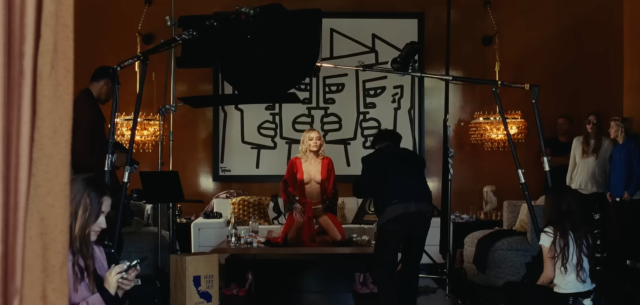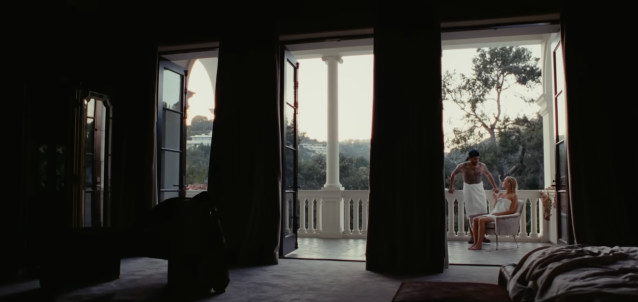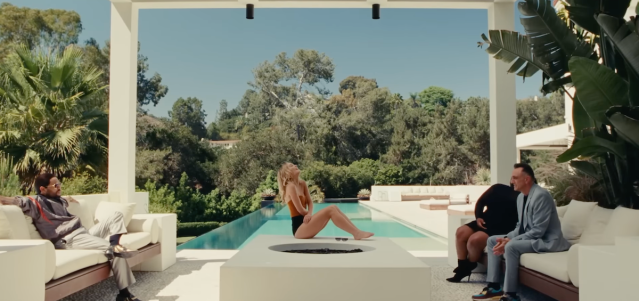Cultism. Trauma Porn. Domestic Violence. Grooming. Hate speech.
Spoiler warning for episodes 2 and 3 of The Idol
Episode 2 of The Idol began hinting at Jocelyn’s unaired trauma as she called out for her late mother while recording a music video. Yet, the scene did not further humanize Jocelyn. It did not paint this blank canvas — a fading pop idol responsive to the whims of executives and a toxic boyfriend — with pointed paint strokes, unearthing the layers of her humanity. Rather, it merely served to freeze the pack of puppeteers pulling her strings—their shock seemingly in place to signal viewers to respond in like. It was never about Jocelyn. The disturbed is in place to fluster — not feel.

Jocelyn’s pleas for her deceased mother are so artificially manufactured for entertainment’s sake — toying willy-nilly with accurate depictions of a fractured psyche to get a rise. It’s as if the writers are deriving some masochistic satisfaction from the pretty girl in pain. She does not exist as a protagonist, but merely as a storytelling tool to set subplots into motion (and bolster Tedros’ antagonism). And, it only gets worse with episode 3.
Early in the episode, Jocelyn talks with one of Tedros’ musical groupies about her mother. A single tear flows from her face as she explains why she doesn’t write a song about her mom. She notes that her fans don’t want to hear it. They wouldn’t relate. And, as the moment climaxes, this “girl power” scene — obtuse in its attempt to relay contemporary culture — ends with Tedros’ follower (more on this terminology to come) wiping a single tear from Jocelyn’s chin.

These two barely know each other, making this act of intimacy baffling and insincere. Trauma surfaces to orchestrate. There’s always a development that will exploit the trauma to return the series to bleakness. The scene is suspiciously saccharine. So sweet in its leveraging for the sadism to come. And what comes is Tedros’ warped approach to setting Jocelyn free — an exercise in domestic violence he believes will free Jocelyn from her musical purgatory.
At the end of episode 3, Jocelyn explains that her mother used to beat her with a brush to motivate her. To get her out of bed in the morning. To convince her to finish a song. To stop her from drinking. She controlled her daughter’s life with physical violence.
Tedros asks Jocelyn if she misses the motivation the beatings apparently catalyzed before asking her to retrieve the brush. He will take the place of her late mom. In his mind, he will bring back the violence Jocelyn’s mother employed to return her to the success she was. Somehow he believes it won’t destroy her in the process? Or maybe he just doesn’t care if it does — as long as he gets his newest pawn to move across the board according to his convictions.

It’s irredeemably twisted. It’s an inexcusable plotline that is utterly jaw-dropping. Not because it’s effective storytelling but because it’s preposterous pandering to a desensitized culture. It’s an attempt at shocking the unshockable generation, and it does nothing more. It’s nonsensical for someone even as delusional as Tedros to endorse this logical fallacy. Where is this pseudo-psychology coming from? How someone in the writers’ room didn’t put the kibosh on this “treatment” — one that seems to exist in the same ideological school as Victorian Era Hysteria treatments — is maddening. It’s 2023. Tedros — via ceaseless sex and exploitation of Jocelyn’ fragile sense of self — has groomed the young woman. He has managed to establish himself as the “hero against the man,” and all those who surround him bow in wonder at this rat-tailed messiah.
Tedros has a crew of musically-inclined people who obey his every command. They go out of their way to explain this to Jocelyn in episode three, bringing the show’s previously subtextual cultist storyline to the surface. As many cult leaders do, Tedros has a vision that, to anyone on the outside, is inherently flawed. His cult operates on the idea that all experiences — no matter how tragic — are positive. Bad experiences lead to good art. It’s an old argument. Yet, here it is more than a theoretical topic of conversation; it is a way of life.
The cult exists to underscore Tedros’ power. It is no more than an extension of the show’s resident villain. The conversation that brings the cultism into the light would’ve been better left unsaid. Hinting at it allowed the series to maintain a level of mystery, as to why these people have fallen at Tedros’ feet. It allowed the series to lead viewers to curate their own hypotheses. Yet, in bringing it forward via dialogue, the show is merely laying a weak foundation for viewers to accept what’s to come…

Within a single episode, Xander falls under Tedros’ spell. With a little ego rub from Tedros, who tells him he’s a genius, Xander is willing to watch (once again) as Jocelyn is whacked mercilessly with a brush. A new cult follower that fast? An advanced mind so easily warped? Establishing the cult so forcefully informs viewers that Tedros has maintained this power for some time — that he has had an equal and instantaneous impact on others in the past. He’s a practiced cult leader. His magic is fast-working. His abilities are endless. There’s just one problem: It’s unsubstantiated bullshit that falls flat in the face of rushed pacing.
And, Leia, the one person who would fight him, he sends away with her new boy toy, Izaak (before ordering Jocelyn to get the brush). And she just goes! She has given no indication that she is jonesin’ so hard for the D that she would abandon her friend in such a vulnerable moment. Yet, we’re supposed to simply swallow that character-defying rubbish? You can argue she’s afraid, but to stay away when she hears the yelling? To not come rushing in or call the police? That’s not Leai, who mere moments before — in a justified panic-stricken frenzy — called Chaim to explain the entire toxic dynamic between Jocelyn and Tedros.
The Idol, with each passing episode, travels further down the rabbit hole of controversy. And, for what? To shock? To unsettle? To have Tedros throw out words like “retarded” haphazardly simply because it’s an eye-widening term. Given his age, no matter how regressive and disgusting he may be, Tedros wouldn’t jump to use this word. It’s a generational insult, making the word’s usage not just impetuous but improbable. So, why say it? Why utter the word that makes the oxygen in the room dissipate? Because people will react…
Well, people are reacting, but not with reflection and consideration. With outrage, annoyance, and disappointment, Rather than giving viewers something to chew on, as he did with Euphoria, Sam Levinson is merely giving them something to spit out.


0 Comments